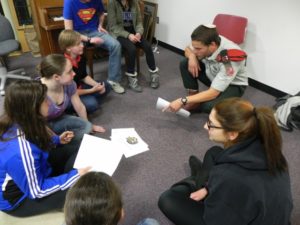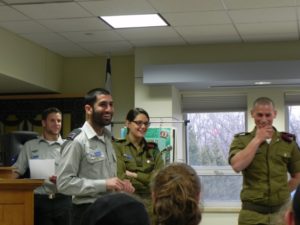“My grandparents sailed to Israel…on the Exodus.”
“My grandmother served in the Haganah and my grandfather fought in the Palmach.”
“My grandfather came from Germany, joined a tank unit, and fought in the War of Independence, the Six-Day War, and the Yom Kippur War.”
“After my great-grandmother made aliyah she founded an orphanage for kids who lost their parents in the Holocaust.”

The soldiers were astonished at the love for Israel that they encountered here. L to r: Lieutenant Gal Negri, Lieutenant Ariel Ben Chaim, and Second Lieutenant Aviv Gvili, Captain Yishai Levy
Photo: Sally Abrams
The program aims to strengthen the connection between Israel and the Diaspora and deepen the Jewish identity of each side. This is the fifth delegation of soldiers to visit the Twin Cities. During their two week stay they interacted with hundreds of the “Frozen Chosen” (more appropriate this year than ever), marked Yom HaZikaron, celebrated Yom Ha’atzmaut, met with Christian supporters of Israel, taught about the IDF…and learned a surprising amount themselves.
The theme of this year’s visit was based on the IDF document “Identity and Purpose”, upon which the approach to education in the IDF is based. One of the core principles is “Connection to the Land”:
The Jewish people have an historic, cultural and religious connection to the Land of Israel and to Jerusalem, the eternal capital of the Jewish people. The Zionist Movement, in all its variations, strived to actualize this connection by re-establishing the Jewish people in its land.
The IDF sees the connection to the Land of Israel as a foundation for the sense of mission and commitment of the soldier in its service. For this reason, the IDF will take steps to strengthen the connection to the Land of Israel and to the values of Zionism.
I had the privilege of meeting with Captain Yishai Levy, Lieutenant Ariel Ben Chaim, Lieutenant Gal Negri and Second Lieutenant Aviv Gvili, and heard stories that brought this connection to the land vividly to life. Each family has a distinguished record of service, from grandparents to parents to siblings.
The red paratroopers beret tucked onto Ariel’s shoulder was his father’s. Ariel underscored the necessity for soldiers to feel a strong connection to Israel and its history. “I take my grandparents’ stories with me everywhere. They give me lots of power and answers. Every time I ask myself ‘Why am I doing this hard job?’ I have answers from my parents and grandparents.
Gal emphasized the centrality of this value to IDF training. “The most important thing is to educate our soldiers to be connected to the land, so that they will know what they are fighting for, to defend the land and provide a safe place for our citizens. We educate them to love the land and love the country.”
This values-based training develops the soldier to live ethically both on and off duty, and is intended to carry over beyond military service, creating future leaders and better citizens.
What are the benefits of mandatory military service? And are American kids missing out on something important by not having mandatory service?
The soldiers responded enthusiastically, ticking off a list of tangible benefits that derive from their IDF service: independence, responsibility at a young age, learning to live in close cooperation with many different kinds of people: Israelis, both religious and secular from every region, as well as Druze and Bedouin.
Moreover, military service speeds maturity and lessens the tendency to be self-absorbed. Said Yishai, “You think more about ‘How will I serve my country?’ than ‘What can I do for myself?'” Gal echoed these thoughts, adding that military service makes you “less spoiled,” more patient, and more willing to help others. The challenges build character. “I know what I am capable of,” Gal added with confidence.
By answering the first question, the soldiers unwittingly answered the second.
The issue of military service for ultra-Orthodox Israelis has been a topic of intense focus and debate within Israel, especially during the recent elections. Ariel, who self-identifies as a religious soldier, commented: Thirty years ago few of the very religious served. The army wasn’t ready to accommodate their needs regarding, for example, level of kashrut, time for study, and Shabbat observance. Now there are two combat units for haredi soldiers, special units that enable enlistment of the religious into the fighting forces. “Change is slow, but it is happening.” These units are solid first steps.
The soldiers will be taking home powerful lessons that they have learned here. All were moved by the commitment to Judaism and love of Israel they have witnessed. Said Aviv, “When soldiers meet Jews from the diaspora they get a real feeling about Jewish peoplehood.”
Some of the soldiers noted with irony that they had visited more synagogues in the last two weeks in the Twin Cities than in the last many years in Israel. “I felt more Jewish here than in Israel…its funny to say,” remarked Yishai, with a smile. With most Israelis dividing neatly into either a religious or secular category, the range of observance here was novel and appealing to the soldiers.
All were astonished by the depth of love and support for Israel that they encountered. Gal felt her own Zionism deepen in response. “When I see you so connected to Israel, I feel even more connected.” That strong connection was personified in a meeting with Leon Frankel, who volunteered to fight in the 1948 War of Independence as part of the “Machalniks” (volunteer soldiers from outside of Israel). It was also the soldiers’ introduction to Christian supporters of Israel, whom they met at Living Word Christian Center. Love for Israel, which they felt from so many across our community, left an indelible impression. This tops their list of “take-aways” to share with fellow soldiers at home.
What is the most important thing to know about the IDF, especially for those who know little or who have been misinformed?
The soldiers cited the “Spirit of the IDF” code booklet that every soldier carries at all times. The code outlines the appropriate and moral use of weapons, how to serve responsibly, with loyalty and respect. Gal added, “When you see this code of ethics you know that this is a humanitarian army. We defend our country because we have to do this, and we fight for our existence.
If we don’t do it, no one is going to do it for us”



